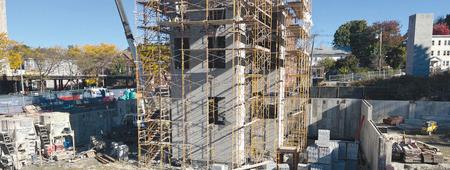



- Joaquin, Pine Street Tenant
I have a park across the street and a little kitchen where I can cook. The case managers help me with anything I need. Going to Pine Street saved me.”





- Joaquin, Pine Street Tenant
I have a park across the street and a little kitchen where I can cook. The case managers help me with anything I need. Going to Pine Street saved me.”
What do the words “welcome home” mean to you? Perhaps you’re back from a long journey and are seeking warmth and comfort; maybe you’re looking forward to seeing loved ones; or you may be longing for a community where people know and care about you.
If you’re someone who is staying on the street or in a shelter, “welcome home” can be two of the most momentous words you can hear. When you have a home, you have safety, comfort and community.
At Pine Street Inn our goal is to move people off the street, out of shelter and back into a home and community. From street outreach to emergency shelter to job training and permanent housing, caring staff provide vulnerable individuals with medical and mental health connections, as well as employment and community engagement.
For over 50 years, Pine Street Inn has provided support and services that enable vulnerable individuals to rebuild their lives. In the past fiscal year (July 1, 2021 – June 30, 2022), Pine Street Inn’s operating expenses totaled more than $79 million. Each year, Pine Street must raise at least 20% of its operating costs from private contributions, and we are grateful to those individual, corporate and foundation donors who invest in our mission to end homelessness.


365 days/year

24 hours/day
7 days/week
People supported daily
2,000+
Pine Street Inn Pine Street Inn operatesA safe, stable place to live, support from caring staff, and an opportunity to build community, are critical elements of the equation to end homelessness. With a 96% retention rate in Pine Street Inn’s housing, we know this approach works.

Pine Street is scaling up our housing. With two locations currently under construction, we look forward to adding 251 new units, with the first new tenants moving in soon and more on the way.

This page: Construction continues on Pine Street’s new residence, 3368 Washington Street in Jamaica Plain.
Next page: Common spaces and communal kitchens at 140 Clarendon Street in Back Bay.

Housing

Total number of units
850
Number of residences
37
Housing retention rate


96%


Pine Street Inn’s outreach team believes in meeting people where they are — literally and figuratively — to support them in moving from the streets to housing. Each year, Pine Street’s outreach teams place over 100 people directly from the street into a home.
The team works to build relationships with people, often over the course of several months, or even years. They engage and encourage them to take the next steps in rebuilding their lives and regaining a sense of community.

Much of James’ childhood was spent dealing with the death of his father, his mother’s alcoholism and bouncing around between various family members. “I learned from an early age that I had to take care of myself,” says James.
James worked doing construction, landscaping and automotive detailing, but still found Boston rents were more than he could afford.
“I’ve been homeless on and off for several years,” he says. “I’ve stayed with friends and in hotels, but that becomes a burden for people and hotels are too expensive.” As a result, James wound up on the street.
When the outreach team first started working with James, he was hesitant. The team worked to build rapport and remained persistent.
Outreach
Eventually, his hesitancy faded and the outreach team helped James move from the street directly into supportive housing. Now James is getting back on his feet. “I’m looking for work, and I hope that in the next couple of years, I’ll be able to afford a larger apartment. I’d like to have my eightyear-old son come to stay with me.”

“The outreach team helped me find this apartment in one of Pine Street’s residences,” James says, “I’m really grateful. It’s in a safe neighborhood, and we have a great community.”
People visited yearly by the outreach team
2,400+


Individuals housed directly from the street
100+ Steps walked by the outreach team
8 MM+
Permanent supportive housing offers long-term safety and stability to people staying on the street or in shelter.
In addition, having a place to call home has a major impact on one’s health and well-being. Studies have shown that housing saves over $10,000 per person/ year in healthcare and emergency room costs, not to mention the immeasurable impact on overall quality of life.

Cheikh, who grew up in Senegal, West Africa, describes his life as “full and rich,” but not without its challenges.
“I worked as a United Nations translator and also as a tour guide in Senegal,” says Cheikh. “I learned a lot about people and myself from both jobs. As a tour guide, I met a wide range of people, including the person who would become my wife. She’s from New York, and I came with her to the United States after we were married.”
While in New York, Cheikh worked in various jobs, but was laid off because of the pandemic. Unfortunately, his marriage did not work out.
Cheikh moved to Boston for a fresh start. While he intended to stay with friends, the pandemic made that impossible, and he wound up without a place to stay.

“I needed help to find housing and a job. I’m now working for a company that I had worked with in New York — luckily their headquarters are in Boston.”
Shelter
Guests housed from shelter
365
Shelter beds
464


Cheikh says, “I never run from challenges because when there are challenges there is learning. I love Boston — the history, the universities, the medical facilities and the culture are all amazing.”
Shelters
5
Along with housing, a job is a critical piece of the puzzle in moving toward self-sufficiency. Each year, our dynamic workforce development program, including our iCater social enterprise and training programs in food services and housekeeping, trains over 140 people to reenter the workforce and move toward independent lives.
In addition to job skills and support in connecting trainees to employers, Pine Street offers financial and digital literacy, resume-writing and mindfulness trainings to help ensure success.

Angeline moved to Boston from Springfield four years ago. “I came to Boston looking for a better life,” says Angeline. “Even though I was working through a temporary employment agency, rent in Boston was too high, and I lost my apartment.”
“Being homeless was a real low point,” continues Angeline. “But I ended up getting a lot out of the experience thanks to Pine Street.”
Pine Street’s housing team helped Angeline find supportive housing in one of our residences in Jamaica Plain. “I moved into my apartment about a year ago,” says Angeline. “It’s quiet, close to grocery stores and transportation, and it’s convenient to my new job. I love it!”
Angeline also completed our food service training program. As part of that program, Pine Street provides
job placement services, and she was recently placed with a college dining service.
“When I was in the training program I would follow Chef Frank [Pine Street’s executive chef] around and take in everything he was doing,” Angeline says. “I learned so many new techniques and ways of working.”

985K


“Now that I have a place to live and a job, I try to motivate others. You have to keep your head up and keep moving forward.”
140+
50+

